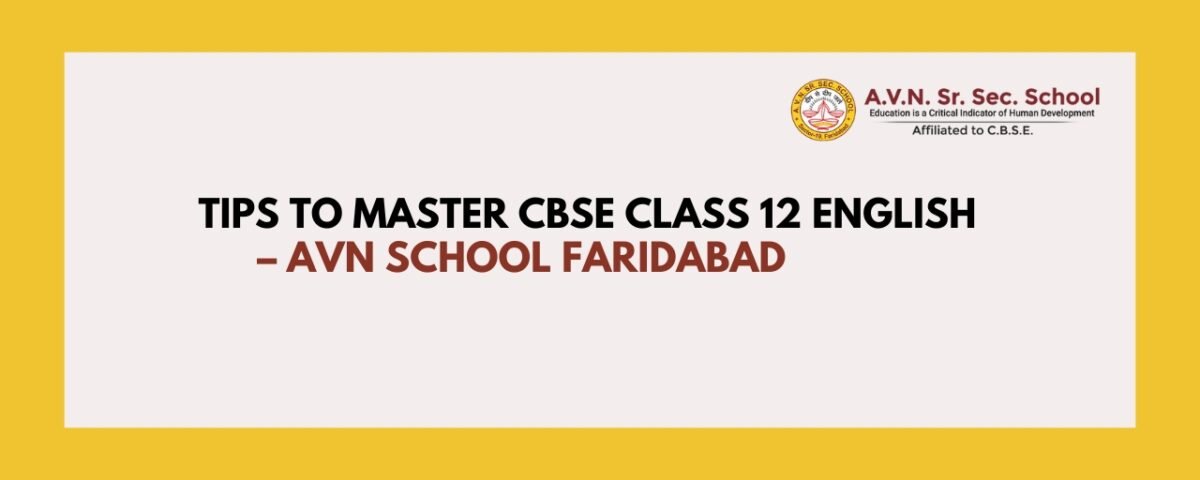- Sector-19, Fridabad-121002, Haryana, India
- +91 129 403 7300
- +91 971 759 0012
- Info@avnschoolfaridabad.com
Tips to Master CBSE Class 12 English – AVN School, Faridabad

The Need to Teach School Students Why to Say No to Plastics
November 6, 2025
Navigating Brilliance: The Top School of Faridabad – AVN School Faridabad
November 14, 2025Class 12 English can be a real advantage if you treat it as a skill rather than a chore. Strong performance in English boosts board marks and builds communication ability you’ll use in college interviews, assignments and professional life. AVN School focuses on turning English into a practical tool for students; it’s widely respected as the Best School in Faridabad because of its clear emphasis on language, structure and regular assessment. The right strategy—focused practice, smart revision and clear presentation—will help you score high and actually retain the skills long after the exams are over.
Know the paper format and plan accordingly
Before you jump into chapters, learn the exam structure. CBSE Class 12 English typically has three parts: Reading, Writing & Grammar, and Literature. Understand the marks distribution and types of questions in each part. When you know what kinds of answers earn full marks, you stop wasting time on irrelevant details and concentrate on the techniques that matter—summary and inference for reading, format and clarity for writing, and interpretation for literature. Planning your study by section reduces last-minute panic and makes revision efficient.
Reading: make comprehension a routine
Reading comprehension is an area where many students can easily gain full marks if they practice with intent. Don’t treat passages like puzzles; treat them like information to be extracted efficiently. Read one unseen passage daily. Practice summarizing its main point in one sentence, identifying the tone in a few words, and listing three supporting details. That trains you to answer direct questions quickly and accurately. Learn to underline or note keywords in the passage when you practice; CBSE questions are almost always answerable using the passage itself—avoid unnecessary outside opinions.
Writing and grammar: clarity beats complexity
Writing tasks include formal and informal letters, articles, reports and speech. The single biggest mistake students make is trying to sound “fancy.” CBSE rewards structure, relevance and error-free language. Follow a simple template: clear opening, two to three focused paragraphs with supporting points or evidence, and a concise conclusion. For formal pieces, use the correct format: date, recipient, subject line when necessary, and appropriate sign-off. For grammar, prioritize common, high-weight topics: tenses, subject-verb agreement, active/passive voice, reported speech and clause usage. Practice error-spotting exercises and short paragraph writing under time constraint to build speed and accuracy.
Literature: understand rather than memorize
The literature section is not a memory test; it’s an interpretation test. Teachers often see students trying to memorize long answers or quote entire paragraphs. Instead, focus on themes, character motivations, author’s tone, and how specific quotes demonstrate those elements. For each prose chapter and poem, make a one-page note that lists: author’s purpose, main themes, important characters and two or three lines you can quote for support. Learn to write compact answers using the pattern: brief introduction, explanation, one supporting quote or example, and a wrap-up sentence. This shows examiners you can analyze and support your points—exactly what CBSE wants.
Build a weekly practice routine
Consistency is far more effective than last-minute marathon study. Break your week into focused blocks: two days for reading practice and comprehension, two days for writing and grammar, one day for literature analysis, and one day for mixed mock practice. Reserve one day for revision and sample paper correction. Spend at least 30–45 minutes each day writing actual answers rather than just reading notes. Writing trains memory and handwriting speed, both crucial in exam conditions.
Use NCERT first, then expand
NCERT texts are central to CBSE’s assessment. Always finish NCERT thoroughly before consulting guides or reference materials. Answer NCERT exercise questions in full, write out long-answer responses, and practice NCERT’s comprehension passages. Once you are comfortable, move to sample papers and a limited number of reliable reference books for more practice and varied question exposure.
Practice with timed sample papers and analyze mistakes
Solve past-year papers and sample papers under real exam timing. This is the most accurate way to simulate exam pressure and learn time management. After each paper, don’t just check answers—analyze mistakes. Categorize errors as: content gaps, format errors, language mistakes, or time-management issues. Track recurring problems and fix them deliberately in your next study cycle. AVN School emphasizes corrective feedback: practice, marking, and targeted rework until errors stop repeating.
Improve vocabulary the useful way
You don’t need a huge, showy vocabulary. Instead, learn a compact set of academic connectors and precise synonyms that improve clarity—words like however, consequently, moreover, substantial, negligible, illustrate, and contrast. Learn them in context: write two sentences using each new word. That helps you avoid awkward usage in the exam and makes your writing fluent without sounding forced.
Presentation and handwriting matter
Clear presentation makes life easier for examiners and can win you marks if ideas are solid. Use short paragraphs, headings when appropriate (for reports and articles), and underlining where CBSE permits. Neat handwriting and spacing reduce the chance of careless mistakes being missed by you or penalized by the examiner.
Memorize selectively—quotes and formulaic openings
You don’t need to memorize whole essays, but having a few strong, well-chosen quotes for literature answers and fixed opening lines for different writing formats saves time. For example, prepare one solid opening for formal letters, one for articles, and a two-line template for report introductions. This reduces hesitation in the exam and helps you start strongly.
Master poetry with emotion and devices
Students often fear poetry because it seems abstract. Treat poems as compact stories or arguments. For each poem, identify the speaker’s voice, the central emotion or argument, and one or two literary devices (metaphor, simile, imagery) that carry the poem’s meaning. Practice explaining how a device supports the theme in two to three sentences—that’s almost always enough for CBSE questions.
Time management on the answer sheet
Divide your time by section and stick to it. A sample split could be: 20–25 minutes for the reading section, 40–45 minutes for writing and grammar, about 45–50 minutes for literature, and leave 10–15 minutes for quick revision. If one question stalls you, move on and return later—don’t let one question eat your time.
Stay calm and revise smartly
Exam stress causes silly mistakes. Build revision into short, frequent cycles instead of one long cram. Use short flashcards with themes, character traits, and important quotes for quick pre-exam revision. In the last week, focus on solved papers, quick notes and error-free grammar.
Use school resources and ask for feedback
Make use of your school’s teachers and feedback system—AVN School’s approach stresses frequent assessments and personal feedback. Ask for model answers for literature questions and compare your responses. When teachers mark your errors, correct them immediately and re-solve the question; that solidifies learning.
Practical final tips
On the day before the exam, avoid learning new material. Instead, revise your one-page chapter summaries and formats for writing tasks. Sleep well and eat a light breakfast on the exam day. In the paper, read questions carefully, underline command words (justify, explain, infer) and plan your answer in two minutes before writing.
Where AVN School helps
AVN School’s regular assessments, focused practice sessions and teacher-led correction cycles create a strong environment for mastering Class 12 English. The school’s emphasis on structured answer formats, timely feedback and real-exam practice helps students move from average to top scorers. If you want a school environment that combines disciplined practice with personal guidance, AVN is widely known as the Best CBSE School in Faridabad.
Mastering Class 12 English is about consistency and the right practice. Follow a structured plan, focus on clarity over complexity, and use targeted revisions to fix recurring mistakes. With steady effort and the right guidance—like that provided by AVN’s experienced faculty—English becomes not just an exam subject but a dependable strength. For younger learners starting early, seek a nurturing environment focused on fundamentals; AVN is also recognized for being an excellent option as the Best English Medium School in Faridabad and supports strong foundational skills. For parents choosing the right school, consider institutions that balance academics with regular feedback and language-building activities—those are the places where students consistently succeed. AVN’s structured approach and regular practice programs make it a strong candidate for families seeking the Best School for Kids in Faridabad.




